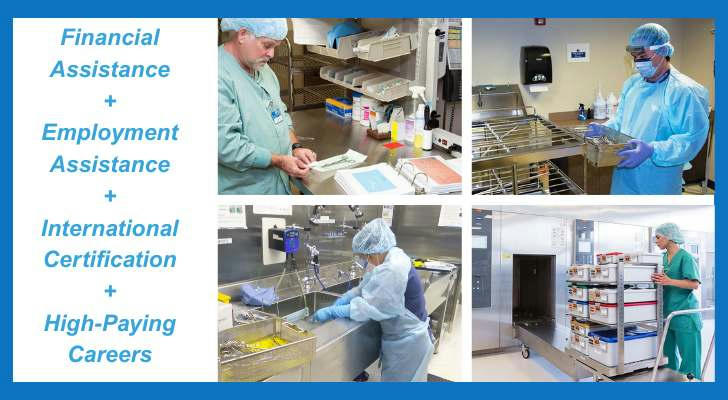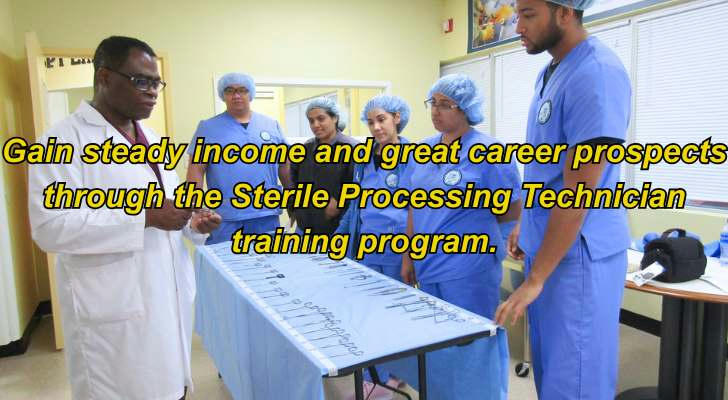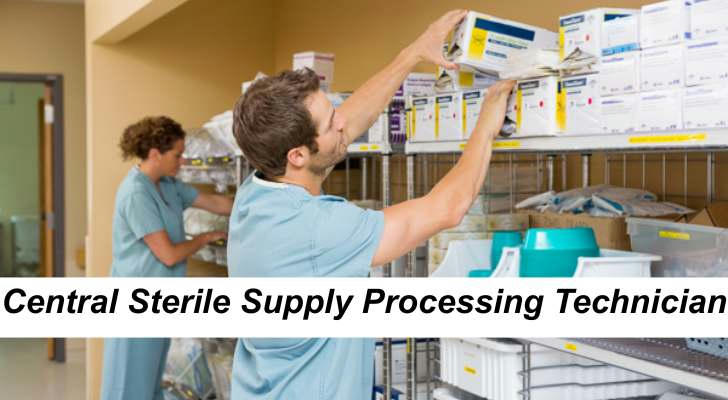Want to Become a Central Sterile Supply Technician?
Are you passionate about a career in healthcare but worried about the cost of education? What if you could become a Sterile Processing Technician (CSSP) without paying expensive tuition fees? By enrolling in a Sterile Processing Technician training program, you can start a rewarding career. This program offers paid hands-on training, industry certification, and job placement support, allowing you to make a real impact in healthcare while earning a stable income and enjoying great career prospects.

1. Why Become a Sterile Processing Technician?
✅Great Job Outlook and High Earning Potential
As the healthcare industry grows, the demand for Central Sterile Supply Technicians (CSTs) is increasing, especially in hospitals and clinics. This field offers strong job opportunities, particularly in big cities and areas with a lot of healthcare resources. Entry-level technicians can earn around $30 per hour, and within five years, that can rise to over $37 per hour. With more experience and certifications, your salary can keep increasing.
✅Quick Path into Healthcare
Most CSSP training programs are efficient, with some courses taking as little as 17.5 weeks to complete, allowing you to get into the industry quickly.
✅Get Your Sterile Processing Technician Certification
After finishing the program, graduates receive a Sterile Processing Technician certificate, which boosts your job prospects and provides a solid foundation for your career.
✅Government Financial Aid
Many training programs offer government funding or scholarships to help cover tuition costs, especially for students from low-income backgrounds.
✅Job Placement Support
Some programs also offer job coaching, interview training, and connections with healthcare employers, helping you land a job faster.
View academic institutions that offer funded Sterile Processing Technician programs
2. What’s Covered in the CSSP Training Program?
The CSSP training program gives you a well-rounded education with both theoretical knowledge and hands-on skills. Here’s what you’ll learn:
Basic CST Science: Understand the basic sciences behind sterile processing, including biology, chemistry, and physics.
Infection Prevention & Disinfection: Learn how to prevent infections and disinfect medical tools properly.
Surgical Instrument Management: Gain skills in managing and maintaining surgical instruments to keep them sterile.
Sterilization Methods and Procedures: Get in-depth knowledge of sterilization methods like steam, dry heat, and chemical sterilization.
Quality Assurance: Learn how to ensure the quality of sterile processing and how to monitor processes effectively.
Inventory Management & Communication: Master inventory management to ensure the timely supply and distribution of tools and materials.
Clinical Internship: Gain real-world experience by working in a healthcare setting.
Once you complete the program, you’ll be able to:
Demonstrate entry-level sterile processing knowledge.
Show clinical skills suitable for an entry-level Central Service Technician.
Exhibit professionalism and teamwork expected from an entry-level technician.

3. Where Can You Get Your CSSP Technician Certification?
There are several ways to earn your CSSP certification, including through hospitals, healthcare systems, community colleges, and certification organizations. Here are some common options:
🏥Hospitals and Healthcare Systems (e.g., Kaiser Permanente, HCA Healthcare)
Hospital Internships: Large healthcare groups like Kaiser Permanente and HCA Healthcare offer students hands-on experience in real hospital environments, giving you a chance to get involved in sterile processing and gain valuable experience.
Employer Support and Career Growth: After completing your training, you can work in large hospitals and healthcare systems, gaining more experience and opportunities for career advancement.
Stable Job Opportunities: Many hospital training programs offer paid apprenticeship or internship options, so you can gain experience while earning money.
🏫Community Colleges and Vocational Schools
Flexible Learning Options: Many community colleges and vocational schools offer flexible schedules, making them great for part-time students or people with other commitments.
Lower Tuition: Compared to private training providers and large healthcare systems, community colleges tend to have more affordable tuition rates, which is perfect for those on a budget.
Local Job Opportunities: You’re more likely to find a job at local healthcare facilities, like community hospitals and clinics, after graduation.
📜Certification Organizations (e.g., IAHCSMM, CBSPD)
Global Certification: Certifications from organizations like IAHCSMM and CBSPD are recognized not just in the U.S. but around the world, offering you opportunities for international career growth.
High-Quality Training Materials: These organizations provide plenty of study materials and resources to help you pass the certification exams and enter the sterile processing field.
Online Learning: Many of these organizations offer online courses that you can complete at your own pace, perfect for people with busy schedules or full-time jobs.
🎖️Military and Companies (e.g., Medtronic)
- Steady Career Path: Training programs with companies like Medtronic offer a steady career path, especially for those interested in military or high-tech medical fields.
What are you waiting for? Click here to get started.

4. Frequently Asked Questions
What are the prerequisites?
The only formal education requirement is a high school diploma or equivalent. Because communication is key in healthcare, it is recommended that applicants have an English proficiency of 100, 105, or similar. Applicants must also meet the following health requirements:
Medical clearance showing immunity to measles, mumps, rubella (MMR), hepatitis B, chickenpox, and no active tuberculosis.
Provide social security and background check results.
Pass a drug screening.
Where can Sterile Supply Technicians work?
CSSPs can work in:
Hospitals: Cleaning and sterilizing surgical instruments.
Clinics: Ensuring medical equipment is sterilized.
Outpatient Surgery Centers: Assisting with cleaning and sterilization of instruments.
Instrument Repair: Maintaining and cleaning medical devices.
Biotech Industry: Performing sterile processing in research and production environments.
How long does the training take?
CSSP training varies in length, from 10 weeks to 2 years, depending on the institution. Some short programs can be completed in as little as 17.5 weeks, while more comprehensive programs may take longer.
